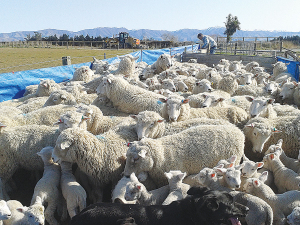Primary Exports Boom Helps Lift PGW Half-Year Earnings
Booming primary sector exports are helping lift earnings for farm service providers.
 Heavily in-lamb ewes carrying multiple lambs need to have a minimum of 1400kgDM/ha of pasture underfoot at any stage to optimise their dry matter intake.
Heavily in-lamb ewes carrying multiple lambs need to have a minimum of 1400kgDM/ha of pasture underfoot at any stage to optimise their dry matter intake.
Severe feed shortages in parts of the country mean many ewes are on a nutritional knife-edge heading into lambing and could be at risk of developing metabolic disorders.
PGG Wrightson veterinarian Charlotte Westwood says going into set-stocking, some farmers will be considering transitioning stock from a high energy, starch-containing feed – such as sheep nuts or grain – onto a post-drought, lush leafy pasture-based diet.
She warns that this dietary change could put ewes, particularly multiple-bearing ewes, at risk of developing metabolic disorders such as sleepy sickness, milk fever and possibly grass tetany. Particularly if there’s not enough pasture available to ewes.
While there are mineral and vitamin deficiencies associated with these metabolic disorders, Westwood says it ultimately comes down to an absolute lack of pasture, in that ewes are simply not getting enough of all nutrients in their diet – energy, protein, vitamins and minerals.
“So it becomes a bit academic about whether it is sleepy sickness causing milk fever or the other way around.”
Heavily in-lamb ewes carrying multiple lambs need to have a minimum of 1400kgDM/ha of pasture underfoot at any stage to optimise their dry matter intake, a challenging requirement for many people this winter.
In regions such as Hawke’s Bay, these pasture covers are not possible this season. Many farmers are having to consider continuing to feed out supplements, such as sheep nuts or grain over lambing.
“Although this is an excellent way to maintain feed intake for ewes, daily feeding out of supplements to set stocked ewes increases risk of mis-mothering between a ewe and her lambs.”
Westwood recommends farmers take an “aircraft oxygen mask” approach. First prioritise the ewe so she is better able to look after her lambs.
“If a ewe ends up with sleepy sickness and/or milk fever, her unborn lambs are at real risk,” she says. “We need to first look after the ewe then follow through with ways to protect any mis-mothered lambs.”
But feeding out supplements and keeping a close eye on wellbeing of new-born lambs could also mean more intensive shepherding over the lambing period, which in itself increases the chances of mis-mothering.
More disruption of set-stocked ewes during feed out of supplements could result in more orphan lambs this season, which adds extra cost, labour and stress after what has already been a very long year.
Farmers could consider setting up hand-rearing facilitates in preparation for mis-mothered lambs and consider asking for help from friends and family with hand rearing lambs over the lambing period.
Westwood acknowledges there is no easy answer this season. However, she strongly recommends that going into lambing farmers update their feed budget – irrespective of how little feed they have. She also suggests they work alongside their vet or consultant to make a plan on which ewes to prioritise – based on scanning results, other stock classes on the property, average pasture covers and supplementary feeds available.
“For example, it might be worthwhile feeding supplementary feeds to the single-bearing ewes to allow pasture covers to build on other parts of the farm so that twin and triplet ewes can be set stocked and left uninterrupted to lamb onto appropriate amounts of pasture.
“Mis-mothering may be less risky for ewes with one lamb at foot than those with triplets. Alternatively, make well-conditioned single-bearing ewes a lesser priority and focus feed and resources on the multiple-lambing ewes.”
Westwood encourages farmers to talk to their vets about what might be required.
The Meat Industry Association of New Zealand (MIA) today announced that Chief Executive Officer Sirma Karapeeva has resigned from the role.
The winners of the 2026 Hawke’s Bay/Wairarapa Dairy Industry Awards were announced at the annual awards dinner held at Copthorne Solway Park in Masterton on Thursday evening.
Environment Southland is welcoming this week’s decision by the Environmental Protection Authority (EPA) to approve the release of Blaptea elguetai, a leaf‑feeding beetle that will help control the highly invasive Chilean flame creeper.
This March, the potato industry is proudly celebrating International Women’s Day on 8 March alongside the International Year of the Woman Farmer, recognising the vital role women play across every part of the sector — from paddocks and packhouses to research, leadership, and innovation.
Fruit trader Seeka posted a record profit and returns to shareholders in 2025.
Recent weather events in the Bay of Plenty, Gisborne/Tairawhiti, and Canterbury have been declared a medium-scale adverse event.

OPINION: A mate of yours truly reckons rural Manawatu families are the latest to suffer under what he calls the…
OPINION: If old Winston Peters thinks building trade relations with new nations, such as India, isn't a necessary investment in…